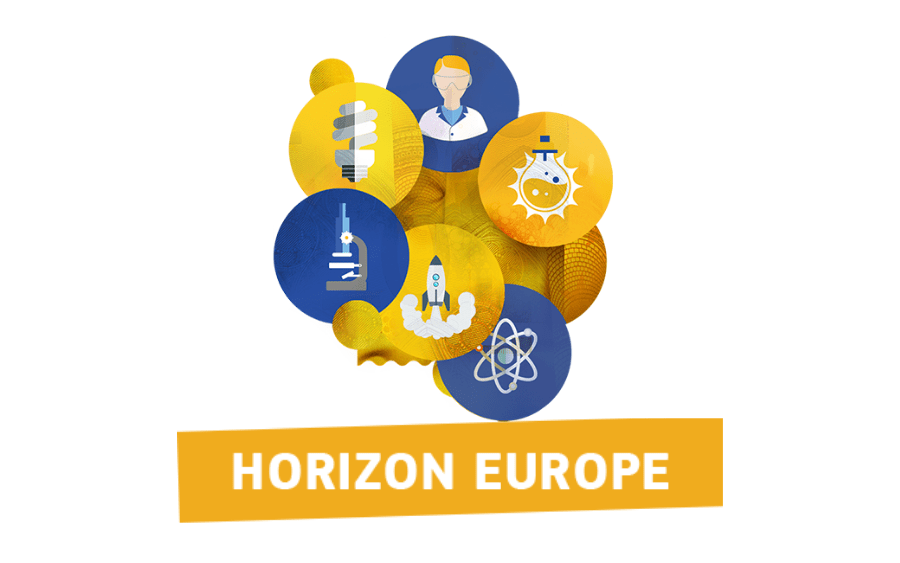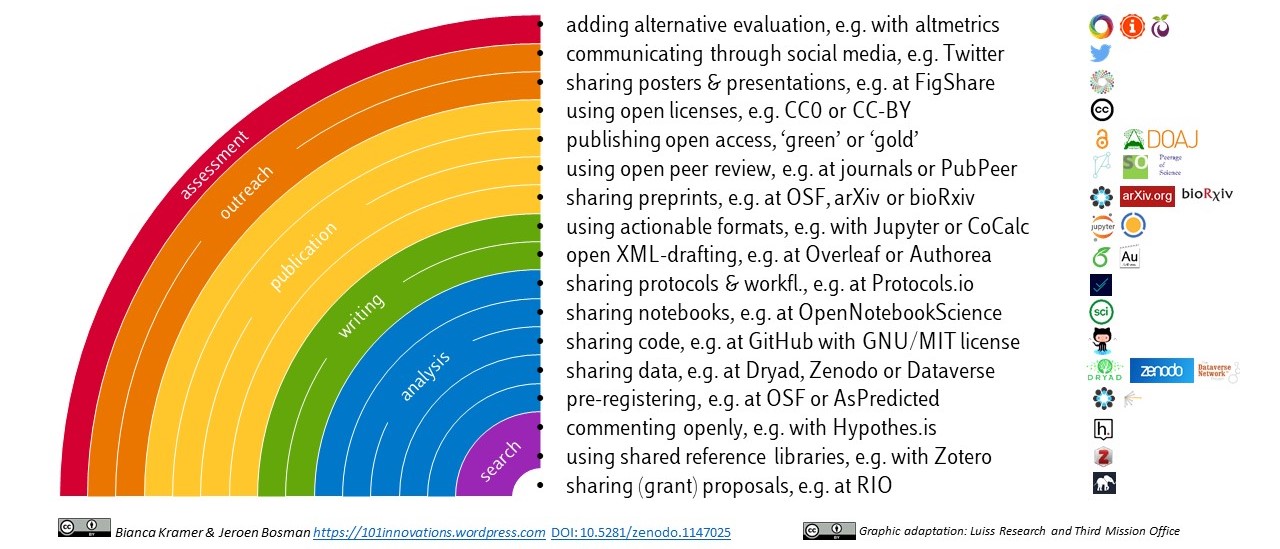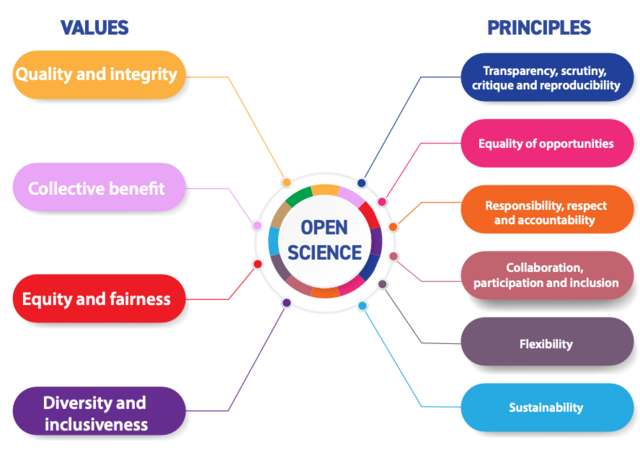RESEARCH AND THIRD MISSION OFFICE
Viale Romania, 32
00197 Rome
ricerca@luiss.it
terzamissione@luiss.it
Open Access
Open Science is the new open and participatory way of carrying out, disseminating and evaluating research.
According to the UNESCO Recommendations on Open Science (2021) and the Italian National plan for Open Science 2021-2027 (2022) it is defined as a collaborative approach to scientific research that combines various activities and practices aiming to make scientific knowledge accessible and timely reusable for everyone. More specifically, its components are:
Open science therefore means making each step of research open, so that data and results are freely usable by everyone: in this way, scientific collaborations and information sharing can be increased and improved, to the benefit of scientific research and the community. Open Science makes it possible to improve the quality of scientific research, because being based on the principles of transparency, reproducibility and sharing, it makes the research results always verifiable, as well as reusable. In this way it allows to implement the sustainable development objectives of the UN Agenda 2030, since it brings science closer to the needs of society and provides equal access opportunities to citizens, researchers and policy makers.
Doing open science involves reviewing the traditional way of doing research, moving from the logic of "publishing" to that of "making available to all". This is not incompatible with current research evaluation practices: many parallel actions can be carried out which do not affect the career of researchers, but on the contrary they favor it.

Open Science is also based on the idea that research financed with public funds must be publicly available: also for this reason in Horizon Europe the adoption of Open practices is one of the evaluation and selection criteria for project proposals in the "Scientific Excellence" section and allowing immediate access to publications is an obligation set out in the Grant Agreement.
- NEW! Open Science Toolkit (2023), a tool developed by UNESCO to support the implementation of open science recommendations
- NEW! Open Science Outlook 1: status and trends around the world (2023), UNESCO publication on the status of open science practices
- NEW! Improving access to and reuse of research results, publications and data for scientific purposes (May 2024), a recent study conducted by the Directorate-General for Research and Innovation of the European Commission about copyright and open science
- Open Science Italia, Italian information portal on Open Science developed by the Institute of Information Science and Technologies of the CNR of Pisa
- OpenScience.eu, platform for the exchange of knowledge and best practices on Open Science managed by researchers and media experts
- Open Science Dictionary (Italian only) edited by AISA - Associazione Italiana per la promozione della Scienza Aperta (Italian Association for the promotion of Open Science)
- FOSTER, e-learning platform that aims to bring together the best training resources on Open Science, developed as part of the H2020 "FOSTER Plus" project
Open Research at Luiss
Luiss Guido Carli adheres to the principles of open access to research results and the principles of responsible research and supports their development, in compliance with the protection of intellectual property.
Open Access
Luiss promotes the principle of Open Access as defined by the Berlin Declaration on Open Access to Knowledge in the Sciences and Humanities signed in October 2003, to which the University adhered through the 2004 Messina Declaration.
In the belief that this method of publication strengthens national and international visibility, dissemination and valorisation of the scientific research's results, since 2016 Luiss has adopted an Open Access policy to regulate the dissemination of the scientific research produced by the University.
Through the University Library, Luiss adheres to several initiatives supporting the Open Access. Moreover, since 2017, Luiss is one of the partners of OpenAIRE, the European Community project aimed at developing an electronic infrastructure to make available published peer-reviewed articles reporting on FP7, H2020, Horizon Europe and European Research Council (ERC) projects' outcomes.
More information is available at the web page dedicated to Open Access on the Library's website.
Open Science from A to Z
As part of the European project CATALISI, in which Luiss is a partner, the seminar “Open Science from A to Z” was held at Luiss on March 23 and 29, 2023. The initiative was aimed at at Luiss professors, researchers, research fellows, PhD students and at the technical-administrative staff who more closely support the research activities of the Departments. The course was delivered by Dr. Elena Giglia, Head of the Open Science Project Unit of the University of Turin, and was structured into two modules:
- The first one, “Open science how and why”, was aimed at outlining to participants the logic and potential of an open approach to scientific communication as an alternative to the current system and its criticalities, especially considering the experience of the pandemic. Open science is not only more robust and verifiable, but - as it provides instant access to all - it results in a greater impact on society due to the potential for reuse of university research data and results. | Watch the recording (in Italian)
- Open Access and Open Science have now become a priority on Europe's political agenda. After the launch of Horizon Europe, the topic has become even more crucial, as the adoption of Open practices is among the criteria for evaluation and selection of project proposals in the "Scientific Excellence" section. The second module, “FAIR data, EOSC and DMP”, addressed some technical aspects of "how to do" Open Science. | Watch the recording (in Italian)
The course materials are available at the page https://doi.org/10.5281/zenodo.7746628 (the materials are in Italian but almost all the documents and tools mentioned are in English).
Making every step of the research “open”

Publishing in Open Access
There are several alternatives to publish in Open Access:
- Publishing in natively open access journals (there are over 12,000 listed in the DOAJ) - The paper is immediately open and any publication costs are reimbursable in Horizon Europe, if foreseen in the budget; however, they may not be the most prestigious journals based on current research evaluation criteria
- Using publishing platforms, preprint servers, open notebooks - These are the most innovative tools but are not yet recognized for research evaluation
- Publishing in hybrid journals: starting from 2020, Luiss Guido Carli - through the University Library - endorses several transformative agreements with the major international academic publishers. More information is available at the Publish in Open Access web page. - Costs to publish in hybrid journals are non-refundable in Horizon Europe
However, to do Open Access it is not necessary to publish in Open Access journals: in fact, researchers can exercise the Secondary Publication Right (SPR). It is possible to continue to publish in traditional journals - those considered more prestigious on the basis of the current evaluation criteria - and then deposit a trustworthy repository (e.g. IRIS) and make available in Open Access the version required by the financier and permitted by the publisher. - In this case, to comply with Horizon Europe obligations for open access to texts, a clause must be used when submitting the paper which allows you to maintain your rights and give immediate access to the postprint without any embargo
- "S-légami! Open Access - Manuale d'uso per i ricercatori" (Italian only) edited by APRE collects answers to the most frequent researchers' questions and concerns regarding Open Access and Open Data
- The Turing way and Open Science passport for PhD manuals explain how to make your research reproducible in the simplest way possible
- The Essentials4data course (free and online) and the CESSDA Data Management Expert Guide (DMEG) provide useful information for the correct management of your data
- How to FAIR is a guide on the FAIR principles (Findable, Accessible, Interoperable, Reusable), on the basis of which research data must be structured to adhere to the principles of Open Science
- ORCID provides a persistent digital identifier managed and controlled by the user, which distinguishes her/him from other researchers: it is possible to link your iD to your professional data and use it to share information with other systems, thus ensuring the right recognition for all contributions
- The Journal Checker Tool is a useful tool developed by Plan S that allows the researcher to quickly check whether a journal's publication policies are compliant with the founder's obligations - including the Europena Commission's Horizon Europe programme
- DOAJ (Directory of Open Access Journals) is an online index of quality open access and peer reviewed journals in which it is possible to publish
- IRIS is the institutional archive of Luiss research products, which allows you to deposit your publications in open access: researchers can publish in their usual journals, but then make their article freely and immediately accessible to all in the version permitted by the publisher (i.e. pre-print, post-print or editorial PDF: to check which it is and if an embargo period is required, consult the SHERPA-RoMEO database) - IRIS is a considered a "trustworthy repository" by Horizon Eruope
- Zenodo is the open archive developed by CERN in Geneva which allows to deposit data and documents and also assigns them the DOI (Digital Object Identifier), thus making them citable
- The OpenAIRE "How to find a trustworthy repository for your data" guide allows the researcher to find other repositories (in addition to IRIS and Zenodo) where data and publications can be deposited in compliance with Horizon Europe obligations
- Creative Commons licenses allow the author to give access to his works by deciding which rights to keep
- Open Research Europe is the publishing platform made available for free by the European Commission in order to give immediate access to publications in compliance with Horizon Europe obligations
- “Open Science in Horizon Europe proposal”, “How to comply with Horizon Europe mandate for Research Data Management”, “How to comply with Horizon Europe mandate for publications” e “RDM in Horizon Europe Proposals” are guides made by OpenAIRE related to Open Science practices in Horizon Europe
- ARGOS is an online tool for writing a Data Management Plan developed by OpenAIRE
- The "Adapt your Data Management Plan" guide by CESSDA collects all the questions that the Data Management Plan should answer
Further tools for doing Open Science in daily research work are listed in the guide Open Science in practice, edited by Elena Giglia and Rebecca Marconi (the guide is in Italian but almost all the documents and tools mentioned are in English).
Find the Luiss experts in...
An innovation paradigm that helps firms progress using external ideas
A project development model based on sharing knowledge and ideas
Solutions and systems to make data management and opening possible
A governance culture based on openness and transparency towards the community
Cover image by Elena Giglia
